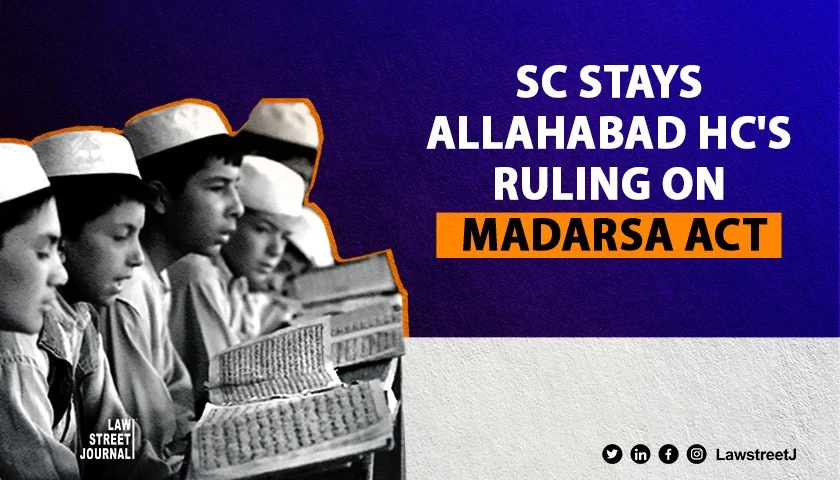NEW DELHI: The Supreme Court on Friday stayed the Allahabad High Court's order of March 22, 2024, striking down provisions of the Uttar Pradesh Board of Madarsa Education Act, 2004 for being "unconstitutional" and violative of the principle of secularism.
A bench led by Chief Justice of India D Y Chandrachud said the striking down of the 2004 law by Allahabad High Court is inconsistent with Article 28 (1) of the Constitution.
The apex court said the purpose of the Act is regulatory in nature and the finding of the high court that the establishment of a board breaches the principles of secularism may not be correct.
Also Read - Plea filed in SC against Alld HC's order declaring Madarsa Act as unconstitutional
The court said prima facie said the law does not provide religious instruction and students are also imparted education in secular subjects like, Science, Mathematics and Social Studies.
The bench, also comprising Justices J B Pardiwala and Manoj Misra, said the High Court's direction would impinge upon the rights of 17 lakh students as it is always a choice of students and their parents to select particular education.
"The States do have legitimate interests in ensuring students are not deprived of quality education. Whether this purpose would not require jettisoning the entire statute would require consideration," the bench said.
Agreeing to examine petitions against the HC's judgement, the court issued notice to the Uttar Pradesh government.
The state represented by Additional Solicitor General K M Nataraj supported the judgment.
The bench pointed out to the law officer the state government before the High Court defended the validity of the statute.
Nataraj said the UP government has accepted the judgment by the Constitutional court and these students can be accommodated in regular schools and there will be no problem for any student.
In its order, the bench said the HC had come to conclusion the 2004 Act violated secularism and the basic structure and fundamental rights. The findings, however, appeared to conflate with regulatory power entrusted with the Madarsa Board. Article 28(1) of the Constitution provides that no religious instruction would be provided in institution fully aided by the government.
"The HC misconstrued 2004 Act, as it does not provide for religious instructions," the bench said.
The UP government contended about 17 lakh students, studying in Madarsas can be accommodated in regular institutions. The state would have to bear financial burden to the sum of Rs 1096 Cr if the judgement was stayed, it said.
Attorney General R Venkatramani submitted that entanglement of religion per se is suspect issue which needs deliberation.
The petitioners led by senior advocates A M Singhvi, Mukul Rohatgi, P S Patwalia, Salman Khurshid and Menaka Guruswamy and others assailed validity of the HC's judgement.
They contended the HC had passed 'farman' and affected Madaras being run under regulatory regime since 1908. Besides, 17 lakh students, the judgement also affected 10,000 teachers, they said.
"It would lead to chaos, as size of the state is more than that of Europe," they said.
The petitioners also there are Gurukuls, Sanskrit Pathshalas across the country. Rohatgi have example of a village in Sivamogga district, where people speak in no other language than Sanskrit.
"Is the State violating secularism by giving aid? Because we teach Islam, the institution does not become that of imparting religious instructions," the counsel said.
On March 22, the HC's division bench of Justices Vivek Chaudhary and Subhash Vidyarthi passed the order on a petition filed by one Anshuman Singh Rathore challenging the constitutional validity of the Act and certain provisions of the Right of Children to Free and Compulsory Education (Amendment) Act, 2012.
The judgment came within months after the state government ordering survey of the Islamic education institutions in the state and also formed a special investigation team (SIT) in October 2023 to probe the funding of Madarsas from abroad.
The high court had held the 2004 Act as violative of Articles 14, 21 and 21-A of the Constitution of India and Section 22 of the University Grants Commission Act, 1956.
"The State cannot, in any manner whatsoever, discriminate between religions while performing its duties. Since providing education is one of the primary duties of the State, it is bound to remain secular while exercising its powers in the said field. It cannot provide for education of a particular religion, its instructions, prescriptions and philosophies or create separate education systems for separate religions,
the HC had said.

















